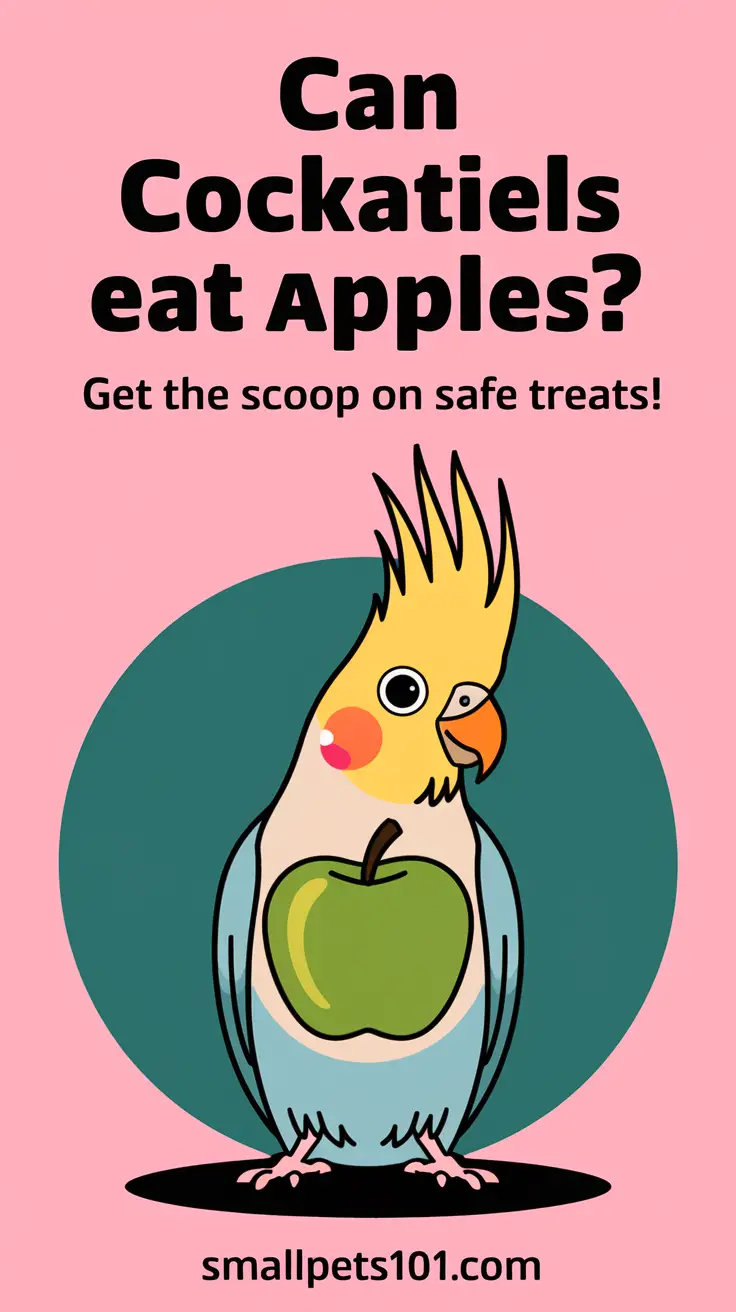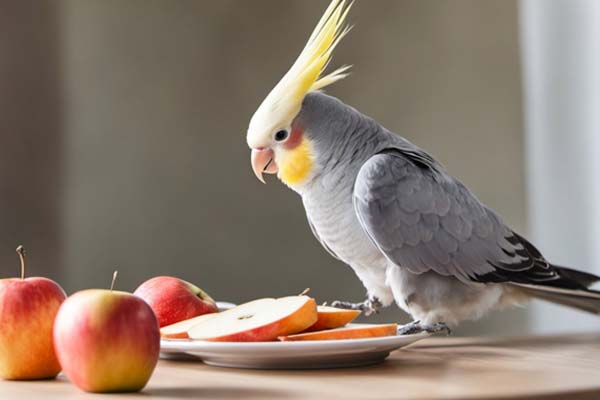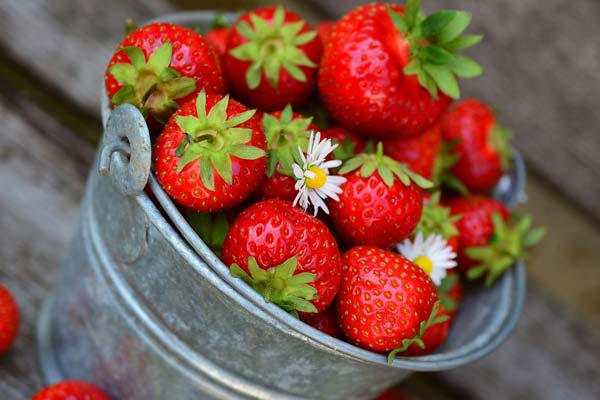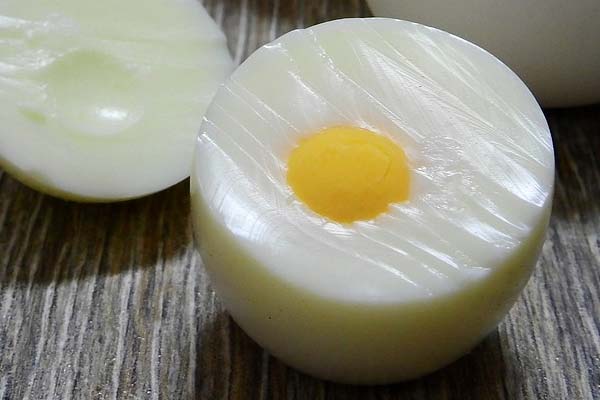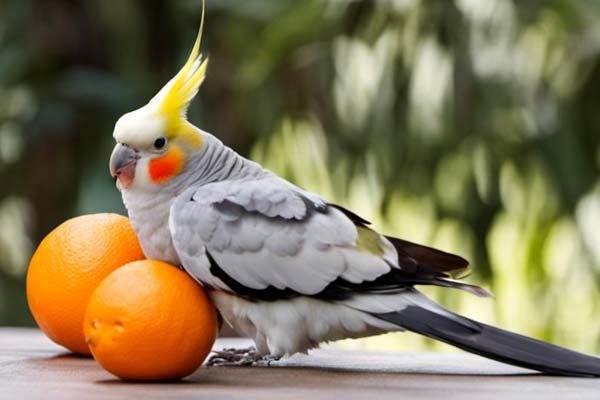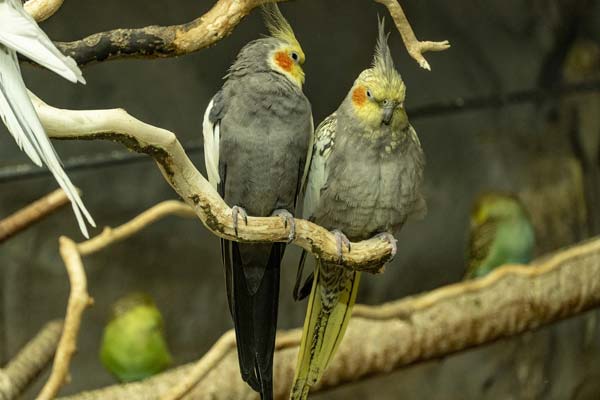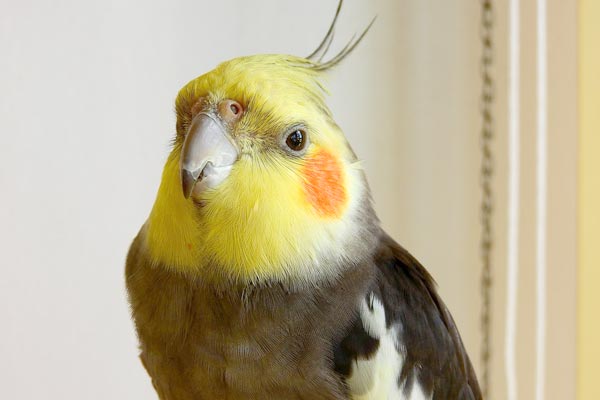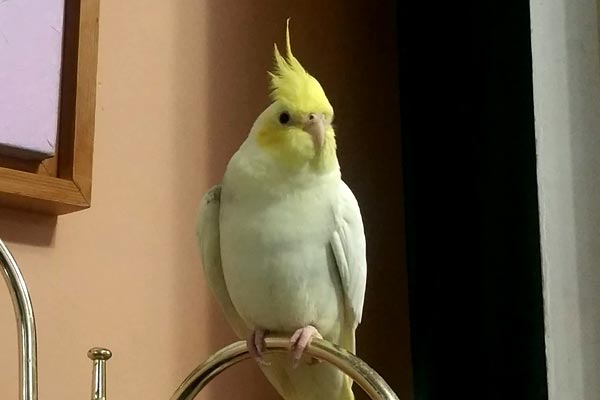Can Cockatiels Eat Apples? Get the Scoop on Safe Treats!
Cockatiels are well-liked pet birds recognized for their friendly behavior and lively traits. Ensuring your cockatiel gets a balanced and nourishing diet is vital to be a responsible owner.
While seeds and pellets are the mainstay of their diet, offering them fresh fruits and vegetables is also essential. One of the common questions that cockatiel owners have is whether their feathered friends can eat apples.
The answer is yes; cockatiels can eat apples. Apples offer valuable nutrients and vitamins for your pet bird’s well-being. Yet, it’s vital to remember that feeding apples to your cockatiel in moderation is crucial.
While they’re generally safe, removing the seeds and core is essential since they have cyanide traces, which harm birds. Overfeeding fruits could also trigger issues like obesity and diabetes.
Apples and Their Nutritional Value
Apples are a tasty fruit that brings numerous health benefits to cockatiels. They have low calories, high fiber, and essential vitamins and minerals.
Check out the nutritional details:
- Calories: A medium-sized apple has about 95 calories, serving as a healthy, low-calorie cocktail snack.
- Fiber: Apples offer valuable fiber, crucial for digestion and preventing constipation in cockatiels.
- Vitamins: Loaded with vitamins like C for a robust immune system and A for good eyesight in cockatiels.
- Minerals: Essential minerals, including potassium and magnesium, promote strong bones and muscles in cockatiels.
- Sugars: Apples contain natural fructose sugar, which is easier for cockatiels to digest than refined sugars.
- Antioxidants: High levels of Antioxidants in apples safeguard the body from free radical damage.
- Vitamin B6: Apples are a solid source of vitamin B6, vital for maintaining cockatiel brain health and mood regulation.
How Apples Benefit Cockatiels
Apples, a nutritious and healthful fruit, offer various benefits to cockatiels. Here are several ways in which apples can positively impact these birds:
Immune System
Apples have antioxidants that enhance the immune system of cockatiels. These antioxidants safeguard the body against free radicals and harmful substances, preventing cell and tissue damage.
Blood Pressure
Apples are a good source of potassium, which aids in controlling blood pressure in cockatiels. This mineral lowers the chance of hypertension and other heart-related issues.
Metabolism
Apples have natural sugars that enhance the metabolism of cockatiels, leading to increased energy and weight loss support.
Bone Health
Cockatiels can benefit from the calcium found in apples, as it promotes robust bone health. Calcium is a vital element for developing and maintaining sturdy bones.
Tissue Repair
Cockatiels benefit from the vitamin C in apples, as it aids tissue repair and wound healing. This vitamin is crucial for producing collagen, a protein that supports and mends the body’s tissues.
Hydration
Apples are also a good source of water, which can help keep cockatiels hydrated. Adequate hydration is essential for maintaining healthy organs and tissues in the body.
Preparing Apples for Cockatiels
When it comes to feeding apples to your cockatiel, it’s essential to prepare them properly to ensure your bird’s safety and health. Here are some tips for preparing apples for your cockatiel:
Washing Apples
Ensure you wash an apple thoroughly before giving it to your cockatiel. This removes any potential dirt or harmful chemicals from the skin. Opting for organic apples is wise to reduce pesticide risks, considering cockatiels’ heightened sensitivity to such substances.
Removing the Skin
While the skin of an apple is safe for your cockatiel to eat, it’s often best to remove it before feeding the apple to your bird. This is because the skin can be tough and challenging for your cockatiel to digest, and it may also contain more pesticides than the flesh of the apple.
Cutting the Apple
When preparing an apple for your cockatiel, cutting it into small, bite-sized pieces is essential. This helps your bird eat and digest it more easily. Remember to remove the apple seeds, too, as they can harm birds.
Risks of Apple Seeds and Pesticides
While apples are generally safe for cockatiels, owners should know some risks associated with apple seeds and pesticides.
Apple Seeds
Cockatiels should not be fed apple seeds because they contain a poisonous cyanide. Although the amount of cyanide in a single apple seed is small, it can accumulate in the bird’s body over time and cause health problems.
Cyanide can interfere with the bird’s ability to transport oxygen, leading to respiratory distress, weakness, and even death.
To avoid cyanide poisoning, owners should permanently remove the apple’s seeds before feeding them to their cockatiel.
If the bird accidentally ingests a seed, it is vital to monitor it for signs of cyanide poisoning, such as difficulty breathing, lethargy, and loss of appetite. If these symptoms occur, the bird should be taken to a veterinarian immediately.
Pesticides
Another risk associated with feeding apples to cockatiels is pesticide exposure. Apples are often treated with pesticides to protect them from insects and other pests. These chemicals can be harmful to birds, especially in high doses.
To minimize the risk of pesticide exposure, owners should opt for organic apples whenever possible. Organic apples are grown without synthetic pesticides, making them safer for cockatiels.
If you can’t find organic apples, wash them well before giving them to your birds. This will help eliminate any pesticides on the fruit’s skin.
Other Fruits Cockatiels Can Eat
Cockatiels can enjoy a variety of fruits alongside apples, which offer essential vitamins and minerals for their well-being.
Here are several safe and nutritious options:
- Berries: Strawberries, blueberries, and cherries are rich in antioxidants, supporting the immune system.
- Grapes: High in vitamins C and K, plus potassium. Remember to slice them to prevent choking.
- Papaya: A vitamin A source aiding digestion. Remove seeds before serving.
- Peaches: Rich in vitamin C and potassium. Discard the pit before offering.
- Melons: Watermelon and cantaloupe provide vitamins A and C, plus potassium.
- Bananas: Potassium and fiber-rich, easily digestible, and a great treat.
- Oranges: Boost the immune system with vitamin C. Seed-free segments are safe.
Remember, moderation is key to avoiding health issues like obesity. Remove pits or seeds, as they can be harmful. Wash fruits thoroughly to remove pesticides before feeding your bird.
Fruits to Avoid for Cockatiels
Cockatiels can enjoy various fruits as treats, but knowing which ones to avoid is essential. Being mindful of these fruits will help keep your feathered friend healthy and happy.
Chocolate
Chocolate is harmful to birds like cockatiels because it contains theobromine. This substance can lead to vomiting, diarrhea, seizures, and even death in birds. To ensure the well-being of your cockatiel, it’s crucial to keep all chocolate and chocolate-based products out of their reach.
Avocado
It’s best to steer clear of feeding avocados to your cockatiel. Avocados are a fruit that can be harmful because they contain a substance called persin, which is toxic to birds.
If ingested, avocados can cause symptoms like difficulty breathing, lethargy, and even sudden death in birds. So, it’s a good idea to avoid giving avocados to your feathered friend.
Caffeine and Alcohol
Caffeine and alcohol can also be harmful to birds, including cockatiels. These substances can cause nervous system problems, seizures, and even death in birds. It is crucial to keep all caffeinated and alcoholic beverages away from your cockatiel.
Garlic
Garlic contains compounds that can be harmful to birds, such as cockatiels. These compounds can cause health problems like anemia. Therefore, it’s best to avoid feeding garlic to your cockatiel.
Salt
Cockatiels require some salt in their diet, but too much is harmful. Excessive salt can cause dehydration, kidney problems, and other health issues in birds. Thus, it would be best to refrain from giving your cockatiel foods high in salt.
Moderation and Balance in Diet
While cockatiels can have apples in moderation without harm, depending on them too much for their diet is not advisable. Consuming excessive amounts of apples can contribute to obesity and other potential health problems over time.
Additionally, it’s worth noting that apple seeds and core contain small amounts of cyanide, which could harm birds like cockatiels if they eat too many. To keep your cockatiels healthy, providing them with a varied and balanced diet that meets all their nutritional needs is ideal.
Cockatiels are sensitive to sodium, so they must avoid feeding salty foods. While apples are not high in sodium, they contain some sugar. Hence, cockatiels should have apples only occasionally and in small portions.
Cockatiel owners should also ensure that the apples have been washed thoroughly before feeding them to their pets to remove any pesticides or other harmful contaminants.
To maintain a balanced diet, cockatiels should be fed a variety of fruits, vegetables, grains, and protein sources. Some good options include bananas, berries, carrots, peas, brown rice, and chicken or eggs. Cockatiels should also have access to fresh, clean water at all times.
Special Considerations for Baby Cockatiels
When it comes to feeding baby cockatiels apples, there are a few special considerations to remember.
Baby cockatiels have delicate beaks that are still developing, so it is vital to ensure that the apples are cut into small, manageable pieces that are easy for them to eat.
Baby cockatiels need special nutrition compared to adult birds. While apples can be a good part of their diet, they shouldn’t be the main food. Baby cockatiels need lots of protein to grow and develop properly.
If you’re unsure about feeding your baby cockatiel apples, it’s wise to talk to a vet or a bird expert. They can give you the best advice for your bird’s age, health, and what it requires.
Effects of Diet on Cockatiels’ Physical Health
Like all birds, Cockatiels need a well-rounded and nourishing diet to keep their bodies healthy.
If they don’t get proper nutrition, they can develop various health problems, such as pulling out their feathers, digestive troubles, fragile bones, heart and liver issues, and anemia.
Feathers are essential to a cockatiel’s physical health, and a poor diet can lead to feather plucking. A lack of proper nutrition can cause the bird’s plumage to dull and brittle, leading to feather loss.
A diet rich in vitamins and minerals, such as those found in fruits and vegetables, can help maintain healthy feathers.
A cockatiel’s sensitive digestive system requires an easily digestible diet. Too much fat and protein can cause digestive problems like diarrhea and constipation. To keep the digestive tract healthy, offer a balanced diet with fruits, veggies, and grains.
Calcium is vital for maintaining strong bones in cockatiels. Not enough calcium can result in weakened bones and fractures. Foods such as leafy greens and fortified pellets, which are high in calcium, play a vital role in promoting bone strength.
Another benefit of a good diet is maintaining a healthy heart. Excessive fat intake can result in fatal heart disease. Choose a balanced diet with fruits, veggies, and grains to promote heart health.
The diet also influences blood health. Inadequate iron causes anemia, which leads to weakness. Excess fat can clog blood vessels and trigger heart issues.
Liver disease and kidney stones can stem from an improper diet. High fat and protein harm the liver, while excessive calcium contributes to kidney stones. A balanced diet with fruits, veggies, and grains fosters a healthy liver and prevents kidney stones.
Impact of Diet on Cockatiels’ Behaviour and Lifespan
A well-balanced diet is crucial for cockatiels’ health. Not getting the proper nutrients can cause health issues like low vitamin A, insufficient calcium, and problems laying eggs.
Cockatiels should eat a mix of fruits, vegetables, and seeds to ensure they get everything they need.
What cockatiels eat also affects their behavior. If they don’t get all the proper nutrients, they can feel stressed and anxious, which might manifest as pulling out their feathers, yelling, or being aggressive.
A high-sugar diet can also cause hyperactivity and muscle coordination problems in cockatiels.
Cockatiels’ diets also affect their nervous systems. A lack of essential nutrients can slow nerve impulses, decreasing cognitive function.
This can affect the bird’s ability to learn, communicate, and interact with its environment.
A cockatiel’s lifespan is greatly affected by its diet. A well-rounded diet high in fats and sugars can lead to obesity and health problems, ultimately shortening the bird’s life.
On the other hand, a well-balanced and nutritious diet can help prevent diseases and promote a longer and healthier life.
